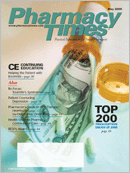Publication
Article
Pharmacy Times
Life-threatening Colchicine Drug Interactions
Few drugs have been around as long as colchicine?it was mentioned at least as far back as the time of Nero. Colchicine can be very effective in the treatment of gout and familial Mediterranean fever. Unfortunately, however, its therapeutic effects (primarily on white blood cells) can lead to life-threatening toxicity if colchicine plasma concentrations become too high. One of the causes of dangerously elevated colchicine concentrations is interaction with other drugs.
Drugs That Interact with Colchicine
Colchicine is a known substrate for Pglycoprotein (PGP), a transmembrane protein that acts to eliminate drugs by expelling them into the bile, urine, and intestine and acting as a blood-brain barrier. The drugs reported to cause colchicine toxicity (eg, clarithromycin, erythromycin, cyclosporine, verapamil) are PGP inhibitors, and it is likely that PGP inhibition is the mechanism for the serious toxicity that has been reported. It also is possible that cytochrome P-450 3A4 (CYP3A4) inhibitors may increase colchicine plasma concentrations through CYP3A4 inhibition, but this effect is speculative.
Reports of Adverse Outcomes
Colchicine toxicity is not a pretty sight, and the reported reactions have been life-threatening or fatal. One patient on colchicine was admitted with fever, diarrhea, myalgia, and abdominal pain 4 days after starting clarithromycin. He subsequently developed multiorgan failure and died.1 Another patient on colchicine developed fever, diarrhea, and abdominal pain 3 days after starting clarithromycin.2 He went on to develop dehydration, pancytopenia, and acidosis, but he survived. Two other patients on colchicine died from agranulocytosis when clarithromycin was given concurrently.3
Similar life-threatening reactions have been reported in patients on colchicine who received concomitant therapy with other PGP inhibitors.4-7 In most cases, colchicine toxicity has occurred in patients on chronic colchicine therapy who are then started on a PGP inhibitor. In one case, however, a patient on chronic verapamil developed colchicine toxicity after taking colchicine for only 2 days.7
Other Clinical Evidence
Additional evidence of an interaction between colchicine and PGP inhibitors comes from a retrospective case-control study of 116 patients who received colchicine and clarithromycin during the same admission.8 Nine of the 88 patients who received both drugs concurrently died, whereas only 1 of the 28 patients who received the drugs in sequence died. Most of the patients who died had pancytopenia.
Predisposing Factors for Interactions
Many of the patients who had an interaction had renal insufficiency, and this condition is presumed to have contributed to the severity of the reactions. Because these interactions result from elevated colchicine plasma concentrations, anything that increases colchicine levels?such as large doses or hepatic disease?could increase the risk.
Managing Interactions
Colchicine should not be used with clarithromycin or erythromycin, and given the potential for fatal outcomes, it would be prudent to avoid all PGP inhibitors with colchicine (Table).
If it is absolutely necessary to use a PGP inhibitor with colchicine, consider decreasing the colchicine dose (or stopping the colchicine) during treatment with the PGP inhibitor. The patient should be advised to immediately report any evidence of colchicine toxicity such as fever, diarrhea, abdominal pain, myalgia, muscle weakness, or paresthesias.
Because many drugs inhibit PGP, colchicine should be handled in the same way that warfarin is. The addition of any new medication?whether or not it has been shown to interact? should be a signal for the pharmacist to remind the patient to be alert for evidence of colchicine toxicity.
Drs. Horn and Hansten are both professors of pharmacy at the University of Washington School of Pharmacy. For an electronic version of this article, including references if any, visit www.hanstenandhorn.com.
For a list of references, send a stamped, self-addressed envelope to: References Department, Attn. A. Stahl, Pharmacy Times, 241 Forsgate Drive, Jamesburg, NJ 08831; or send an e-mail request to: [email protected].

Newsletter
Stay informed on drug updates, treatment guidelines, and pharmacy practice trends—subscribe to Pharmacy Times for weekly clinical insights.






